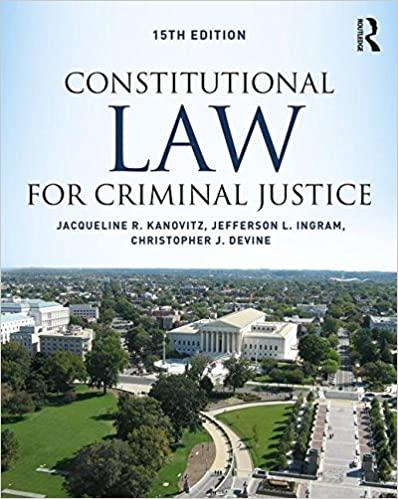Question
1.Allen borrowed $300 from Baker. Carter asked Allen to lend him the $300 for one day. Allen agreed to lend Carter the money provided that
1.Allen borrowed $300 from Baker. Carter asked Allen to lend him the $300 for one day. Allen agreed to lend Carter the money provided that Carter would promise to pay the $300 to Baker instead of to himself, Allen, on the following day. Carter promised as requested, whereupon Allen loaned him the money. Carter then failed to pay the money to Baker as agreed. Does Baker have a cause of action against (a) Carter, (b) Allen?
2.Mrs. Alcorn divorced her husband, and the court ordered their child, David, to live with his mother. The husband promised Mrs. Alcorn to give David a college education if lfrs. Alcorn would allow David to live with him, which she did. When Mrs. Alcorn died, David sued his father for an alleged breach of contract between his mother and father, alleging that he, David, had not obtained the college education. Can David recover?
3. Klinger and Company was the owner of a warehouse in the borough of Butler, Pennsylvania, which was used by them for the storage of grain. The adjoining premises were owned by Charles Duffy. Along the opposite side of Duffy's lot was located a side track of the Western Railroad. Klinger and Company, in order to procure switching connections with this side track, which would enable the railroad to bring freight cars directly to Klinger and Company's warehouse, entered into an agreement with Duffy, whereby Duffy agreed "to let Klinger and Company and the Westem Railroad use the ground from the side track across Duffy's property to the Klinger and Company's warehouse for a period of five years at the yearly rental of $25.00 per year." This contract was signed by Klinger and Company and Duffy. Klinger and Company and the Western Railroad used Duffy's property for four years, after which time Duffy refused to let the Western Railroad come across his property. The Western Railroad sued Duffy for specific performance to compel him to allow them to cross his property. Judgment for whom?
4. Ringwood, a laborer, in consideration of groceries to be furnished to him by one McDaniel a power of attorney to collect from anyone who might employ him, Ringwood, such sums as might be due for groceries furnished by McDaniel. This power of attorney was executed in September L927, and Ringwood entered the employ of a railroad company in September 1928. McDaniel sued the railroad company for the amount of the groceries furnished Ringwood between September 1927 andseptember 1928. Canhe recover?
5. Thomas entered into a contract with Burns and Toole for the delivery of one thousand bales of cotton on the first day of each month for a period of twenty-four months, payment to be made in thirty days after delivery. Within ten months after the making of the contract burns and Toole retired from business and assigned all assets, including this contract, to Hopkins. Thomas, on the first day of the following month, refused to deliver to Hopkins the usual one thousand bales of cotton. The price of cotton was then higher than the contract price, and Hopkins sued Thomas. Can he recover?
6. Andrews contracted to purchase at ten cents per pound all of the grapes produced by the Sonoma Vineyards for a period of ten years. Andrews subsequently assigned his right to these crops to the Casey Winery. Must the Sonoma Vineyards deliver to the Casey Winery?
7. Hadley made a contract with the City of New York for the cleaning of its streets for a period of five yqrs, and after performing for two years, conveyed his interest in said contract to one Devlin. Upon hearing of _ this, the city created the contract with Hadley as discharged and refused to permit Devlin to perform. Devlin them brought suit against the city. Can he recover?
8.Primrose assigned to Webb an account of $2,000 owing him by Worsted. Webb sued Worsted for the $2,000 and Wonted defended on the ground that Primrose owed him $2,5@ for another account. (a) Was this a good defense? (b) Was the assignment of Primrose to Webb valid? (c) Does Webb have any rights against Primrose?
9- A contracted with B to drill on the lattet's land, for $500 a gas well according to certain plans and specifications. B was to pay $250 when the work was half done and $250 upon completion. B left that state to attend to some business. A assigned thecontract to X. X, acting under the conhact, began to drill the well but became insolvent and abandoned the operation when the well was only one-third completed. Upon returning to the state and discovering what had happened, B asked A to complete the well, but A refused. B had the drilling of the well completed by another at a cost of $600. He then sued A to recover damages for breach of contract. Will he recover?
Step by Step Solution
There are 3 Steps involved in it
Step: 1

Get Instant Access to Expert-Tailored Solutions
See step-by-step solutions with expert insights and AI powered tools for academic success
Step: 2

Step: 3

Ace Your Homework with AI
Get the answers you need in no time with our AI-driven, step-by-step assistance
Get Started


